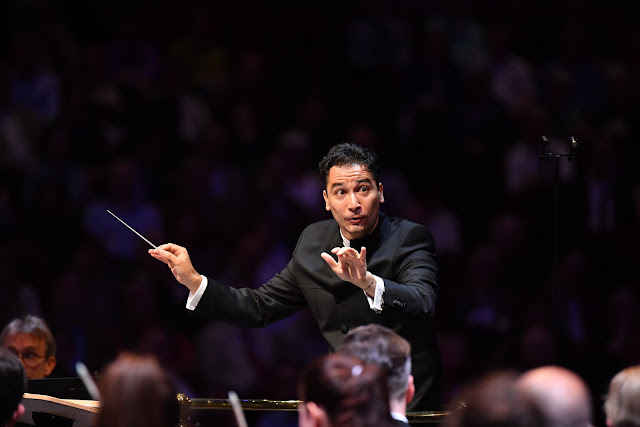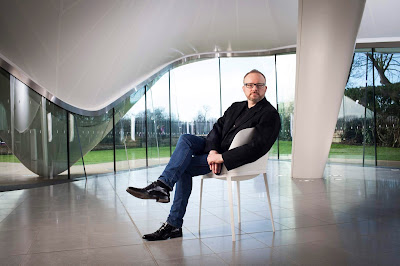 |
Prom 74 - NDR Radiophilharmonie, Andrew Manze, Elizabeth Watts
BBC Proms (Photo Chris Christodoulou / BBC) |
Handel Music for the Royal Fireworks,
Beethoven Concert Aria, "Ah Perfido!",
Bach (arr. Elgar) Fantasia and Fugue in C minor, BWV537,
Beethoven Fidelio, Overture and 'Abscheulicher!', Symphony No. 5;
Elizabeth Watts (soprano),
NDR Radiophilharmonie Hanover/Andrew Manze;
BBC Proms at the Royal Albert Hall
Reviewed by Colin Clarke on 13 September 2019
Star rating: 4.0 (★★★★)
Coupling Beethoven’s music with that of two of his great musical heroes, Handel and Bach
Friday the 13th (13 September 2019) brought a Proms tradition – Beethoven Night – back to life with a visit from the North German Radio (Norddeutscher Rundfunk) orchestra, Hanover under their Chief Conductor since 2014, Andrew Manze, with soprano Elizabeth Watts. Coupling Beethoven’s music with that of two of his great musical heroes, Handel and Bach, was effective and imaginative programming.
Initially associated with early music, Manze was a member of the group Romanesca; in 1996 he was appointed as Associate Conductor and Director of the Academy of Ancient Music. Manze’s contract with The NDR Hannover Orchestra has been extended until Summer 2023, and it is easy to see how the orchestra admires him and responds well to him. Handel’s
Music for the Royal Fireworks was given a surprisingly smooth, even gentle reading, the 'Largo alla siciliana', also called 'La paix' actually fairly indulgent, although rescued by a pronounced linear awareness. Perhaps 'La Rejouissance' could have been more festive, although that was in keeping with the rest of the performance. It was Handel, too, who provided the final pieces of the concert, in encore form: two movements from the
Water Music Suite in G.
In between was a rare outing of Beethoven’s
Concert Aria, 'Ah, perfido!'. Young man’s music (written aged 25), this was the point at which the whole evening went up a notch or two. Elizabeth Watts was a superb interpreter, pure and smooth at 'Per pietà,' properly agitated at 'Ah, crudel!'. The opening section (the bit with the text by Metastasio) was superbly accompanied by Manze, the orchestra light but presenting great detail. It was difficult to imagine a greater contrast than the Bach/Elgar
Fantasia and Fugue in C minor (BWV 537). No missing the Elgarian sheen to the Fantasia; this is echt-Prom material. If the ear does have to adjust to that harp, there is no denying the effectiveness of the timpani heartbeat. All this was brilliantly delivered by Manze’s forces; impossible to ignore, too, the cheeky flourishes of the cymbal.
Two
Fidelio excerpts formed the opening of the second part of the concert, the Overture light in the opening exchanges, lithe in the faster section. Clarity again at a premium, the performance was nevertheless a touch underpowered; not a criticism that could be levelled at the superb 'Abscheulicher!' that followed, Watts absolutely inside the role (how she enjoyed the “sch” sound of 'Abscheulicher') supported by a fine set of horns, individuals all in their solos and yet as one when required.
And so to the Fifth. That word again – “lithe.” Fast, light, exposition repeat intact, the woodwind/strings exchanges scrupulously observed. The most mesmeric moments of the evening were contained in a beautiful plateau of chords in the 'Andante con moto', revelatory in their spectral demeanour. The scampering double-basses of the Scherzo were a true delight alongside bullet-hard timpani, the transition to the finale intelligent rather than apocalyptic. The finale’s ebb and flow enabled a more variegated landscape than most, enabling moments of an almost startling tenderness. The coda, fast but not pressed, seemed perfectly in accord with Manze’s interpretation: enlightening, intelligent and ultimately more satisfying than any dash to the finishing line.
Reviewed by Colin Clarke
Elsewhere on this blog
- An interesting and illuminating mix: I chat to Ensemble Hesperi about combining Scottish Baroque music with Highland dance - interview
- A listening challenge: Philippe Manoury's large-scale musical fresco for piano duo and electronics in a stunning performance (★★★) - Cd review
- A terrific place to start an exploration of Jonathan Dove's
non-operatic output: Lawrence Zazzo, BBC Philharmonic, Timothy Redmond
on Orchid Classics (★★★★) - CD review
- A considerable company achievement: David Blake's Scoring a Century from British Youth Opera - Opera review
- Prom 63: A 'nice mountain to climb', Yuja Wang, Dresden Staatskapelle, Myung-Whun Chung at the BBC Proms (★★★★★) - concert review
- To avoid being the sort of group which comes in, does a concert
& goes away again: I chat to violinist David Le Page, artistic
director of the Orchestra of the Swan - interview
- The Late Romantic Violin: music by Vladigerov, Poulenc & Seaborne (★★★★) - CD review
- Prom 61: Ultimately, rather uninvolved - the Vienna Philharmonic in Dvořák and Korngold (★★★★) - concert review
- All was stylish & expressive, leaving us to enjoy the music
& the comedy in such an engaging way that the time sped by: British
Youth Opera in Rossini's La Cenerentola - opera review
- An unforgettable night: a true slice of history in the making: Bernard Haitink, Vienna Philharmonic & Emmanuel Ax at the BBC Proms (★★★★★) - concert review
- A passionate evening: Bellini's I Capuleti ed I Montecchi at Grimeborn (★★★) - opera review
- A dazzling carnival erupts onto the stage and we don't want it to stop: Berlioz Benvenuto Cellini at the BBC Proms (★★★★★) - opera review
- Home















.jpg)

.jpeg)





.jpeg)